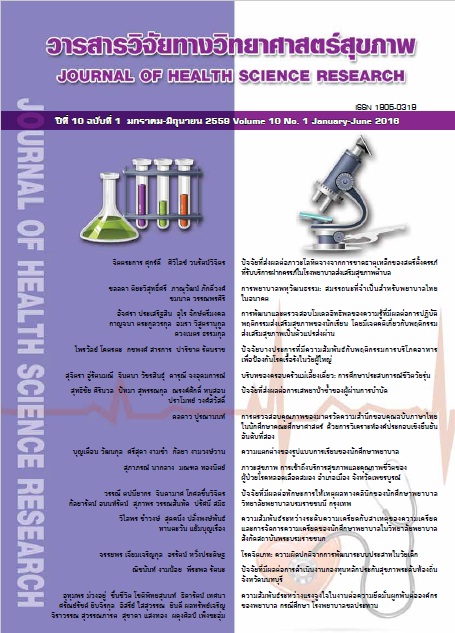ปัจจัยบางประการที่มีความสัมพันธ์กับพฤติกรรมการบริโภคอาหารเพื่อป้องกันโรคเรื้อรังในวัยผู้ใหญ่
Main Article Content
บทคัดย่อ
บทคัดย่อ
การวิจัยครั้งนี้มีวัตถุประสงค์เพื่อศึกษาระดับพฤติกรรมการบริโภคอาหารเพื่อป้องกันโรคเรื้อรัง ในวัยผู้ใหญ่ และปัจจัยที่มีความสัมพันธ์กับพฤติกรรมการบริโภคอาหารเพื่อป้องกันโรคเรื้อรัง ได้แก่ ปัจจัยส่วนบุคคล การรับรู้ประโยชน์ของการบริโภคอาหารเพื่อป้องกันโรคเรื้อรัง และอิทธิพลระหว่างบุคคล กลุ่มตัวอย่างเป็นประชาชนวัยผู้ใหญ่ที่อาศัยอยู่ในจังหวัดอุบลราชธานี จำนวน 400 คน เครื่องมือที่ใช้ประกอบด้วย 1) แบบวัดการรับรู้ประโยชน์ของการบริโภคอาหารเพื่อป้องกันโรคเรื้อรัง 2) แบบวัดอิทธิพลระหว่างบุคคล และ 3) แบบวัดพฤติกรรมการบริโภคอาหารเพื่อป้องกันโรคเรื้อรัง ผ่านการตรวจสอบความตรงตามเนื้อหาโดยผู้เชี่ยวชาญจำนวน 3 คน มีค่าดัชนีความสอดคล้องเท่ากับ 0.65 และหาความเที่ยง ของเครื่องมือโดยวิธีการหาค่าสัมประสิทธิ์แอลฟาของครอนบาค (Cronbach’s alpha coefficient) ได้เท่ากับ .84, .71 และ .70 ตามลำดับ วิเคราะห์ข้อมูลโดยการหาค่าร้อยละ ค่าเฉลี่ย ส่วนเบี่ยงเบนมาตรฐานไค-สแควร์ (Chi-square test) และค่าสัมประสิทธิ์สหสัมพันธ์ของเพียร์สัน (Pearson’s product moment correlation coefficient) ผลการวิจัยพบว่า กลุ่มตัวอย่างมีการรับรู้ประโยชน์ของการบริโภคอาหารเพื่อป้องกันโรคเรื้อรัง และอิทธิพลระหว่างบุคคลอยู่ในระดับมาก ร้อยละ 94.24 และ 88.97 ตามลำดับ ส่วนพฤติกรรมการบริโภคอาหารเพื่อป้องกันโรคเรื้อรังส่วนใหญ่อยู่ในระดับปานกลาง ร้อยละ 67.50 สำหรับการรับรู้ประโยชน์ ของการบริโภคอาหารเพื่อป้องกันโรคเรื้อรัง และอิทธิพลระหว่างบุคคลมีความสัมพันธ์ทางบวกในระดับต่ำกับพฤติกรรมการบริโภคอาหารเพื่อป้องกันโรคเรื้อรังอย่างมีนัยสำคัญทางสถิติ (r = .31, p < .01) และ (r = .37, p < .01) ดังนั้น จากผลการศึกษาครั้งนี้อาจใช้ประโยชน์ในการส่งเสริมและสนับสนุนพฤติกรรม การบริโภคในวัยผู้ใหญ่เพื่อป้องกันโรคเรื้อรังต่อไป
Abstract
This research was aimed to determine the level of food consumption behavior for chronic disease prevention in adults and some related factors such as personal factors, perceived benefits of food consumption for chronic disease prevention, interpersonal influences and food consumption behavior for chronic disease prevention among adults. Samples consisted of 400 adults living in Ubon Ratchathani province. The instruments used for data collection were the perceived benefit questionnaire, interpersonal influence questionnaire, and food consumption behavior for chronic disease prevention questionnaire. These instruments were tested for their content validity by a panel of 3 experts.Internal consistency reliability for each questionnaire was tested using Cronbach’s alpha coefficient (r = .84, .71, and .70, respectively). Data were analyzed by using percentage, mean, standard deviation, Chi-square test, and Pearson’s product moment correlation coefficient.The results revealed that participants had high level of perceived benefits of food consumption for chronic disease prevention and interpersonal influences (94.24% and 88.97%, respectively). However, food consumption behavior for chronic disease prevention was in moderate level (67.50%). Moreover, the perceived benefits of food consumption for chronic disease prevention and the interpersonal influences were positively significant correlated to food consumption behavior (r = .31, p < .01) and (r = .37, p < .01), respectively. The results of this study would be benefial to promote knowledge and attitude of changing appropriate behavior on food consumption.It would enhance adults' well – being and reduce the potential risk of chronic illness.
Downloads
Article Details
บทความที่ได้รับการตีพิมพ์เป็นลิขสิทธิ์ของวิทยาลัยพยาบาลบรมราชชนนี จังหวัดนนทบุรี
ข้อความที่ปรากฏในบทความแต่ละเรื่องในวารสารวิชาการเล่มนี้เป็นความคิดเห็นส่วนตัวของผู้เขียนแต่ละท่านไม่เกี่ยวข้องกับวิทยาลัยพยาบาลบรมราชชนนี จังหวัดนนทบุรี และคณาจารย์ท่านอื่น ในวิทยาลัยฯ แต่อย่างใด ความรับผิดชอบองค์ประกอบทั้งหมดของบทความแต่ละเรื่องเป็นของผู้เขียนแต่ละท่าน หากมีความผิดพลาดใด ๆ ผู้เขียนแต่ละท่านจะรับผิดชอบบทความของตนเองแต่ผู้เดียว


